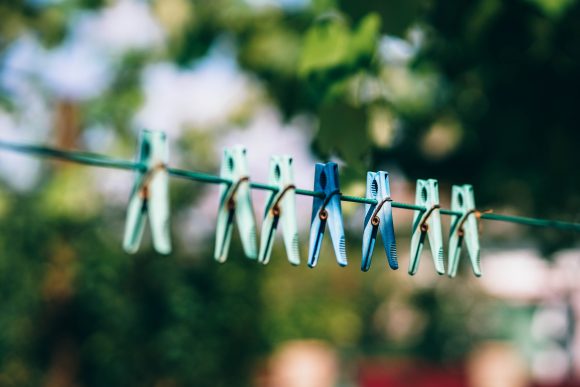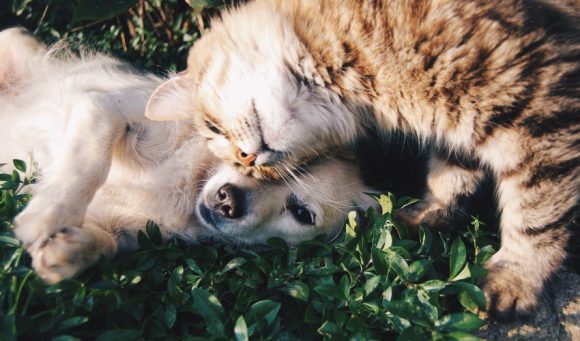Cleaning products used around the home contribute to air pollution, pollutants in the waterways that harm wildlife, and are damaging to human health too.
Pets are at an even higher risk as they’re smaller, have faster metabolisms, aren’t aware of the risks, and have a natural curiosity.
Using pet-friendly cleaning products and methods that are natural and free of chemicals not only protects your pets, but yourself, and the entire environment at the same time, helping to create a safer planet.
Ditch the cleaning chemicals

Cleaning with harsh chemicals has become the norm, but it’s incredibly harmful to you, your pets, and all other life once it gets washed into the waterways.
Fortunately, there’s really no need for cleaning with chemicals in your average household as there are plenty of natural and animal-safe alternatives that will do just as good of a job.
Citric acid, baking soda, lemons, and vinegar are all pet-safe, eco-friendly, are good for common cleaning chores around the home, and are better for your health too compared to breathing in traditional cleaning products.
Citric acid is particularly good for limescale and cleaning toilets, while you can use vinegar, water, and a squeeze of lemon to mop floors with and use as a general cleaner around the home.
This means if your dog is prone to drinking from the toilet or your cat licks the floor after you’ve washed it you won’t need to worry about closing them out of the room or remembering to keep the toilet lid down as there’s no risk to them.
Keep animals safe when washing up

Doing the washing up is a mundane task that everyone has to do, whether you’re doing it by hand or loading a dishwasher.
Washing up liquid and dishwasher tablets and powders are another set of cleaning products that are usually full of chemicals that are unnecessary for the job and potentially harmful and toxic to pets when you wash up their bowls, plates, and spoons.
There is less risk with them compared to other household cleaners as they’re designed to wash what you eat your food off of but this comes back to animals being smaller and having faster metabolisms, putting them at a higher risk.
When the cleaners enter the waterways they can also do harm to ecosystems and wildlife, so switching to a cleaner that’s good for you, your pets, and the wider environment is the better option again.
Look for products with plant-based ingredients that are fully biodegradable and free from crude oil and artificial fragrances.
Dealing with mold problems

Bigger jobs around the home, such as cleaning away mold, can make you think chemical cleaners are the only option, particularly if the problem has gotten out of hand.
In some cases, this will be true, so the best option is to call in the professionals to deal with it and temporarily move out of your home with your pet while the chemicals are in the air.
Catching the mold before it gets to this stage is best as it can be cleaned with baking soda, which absorbs the spores and can then be wiped away.
Find what’s causing the mold growth so that you can prevent it. This is often things like leaky plumbing pipes, broken roof tiles or windows, and high humidity in the home.
Fixing these is key to preventing mold, and a dehumidifier can help to remove moisture in the air in a safe and pet-friendly way.
Managing animal fur
Having furry friends often means your home faces the problem of getting covered in pet hair. Regularly brushing your pet, ideally outside, will help to reduce the amount of loose fur on their body that then falls off around your home.
You can train some pets, such as dogs, not to jump up onto furniture that you don’t want to get fur on, like your bed or sofa.
The best way to clean up animal fur is by simply vacuuming it up, which can be a daily job when your pet is shedding a lot.
You can cover some areas with blankets or removable covers that you can throw in the washing machine as a quick way of cleaning your home, which allows your pet to join you on the sofa or bed without having to worry about the mess they’ll make.
Washing laundry without chemicals

Modern laundry detergents and fabric conditioners all come with warning labels regarding the damage they cause to the environment when they enter waterways and the health risks they can pose to people.
If you get a rash or have other allergy-like symptoms, one of the first things most people will ask is whether you’ve recently changed your laundry products due to how common allergies and health problems caused by them are, and this extends to your pets too.
Some breeds of dogs have more particularly more sensitive skin and certain pets, just like people, will be more prone to allergies and so are at higher risk.
An allergy to laundry detergents in cats and dogs can cause itchy, irritated skin, chronic ear and skin infections, and, if they lick or chew on something you’ve washed, it has the potential to be toxic, depending on the chemicals used.
It’s better to wash with natural, pet-friendly laundry products that don’t harm the environment all the time, or least when you wash your pet’s beds, blankets, and toys to help to keep them safe.
Suggestions:

Soap nuts are good for replacing detergents and half a cup of vinegar will act as a fabric conditioner that also cleans your machine at the same time, but you may find that you won’t need a conditioner at all when you ditch the chemicals.
Pets can make a house feel like a home, so be sure to clean up after them and around them in a safe way that’s also environmentally-friendly, but doesn’t put the cleanliness and health of your home at risk.
Using pet-safe products means you can get on with cleaning without having to worry about your pet as there’s no risk that they’ll become ill if they lick the floor after you’ve cleaned it, taking one stressors out of your life.
This article is a contribution of dr Jane Sandwood.




Leave a Reply